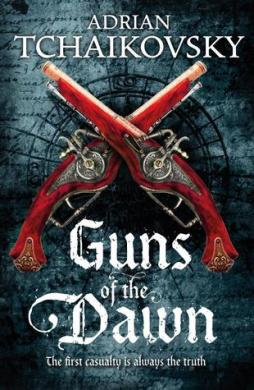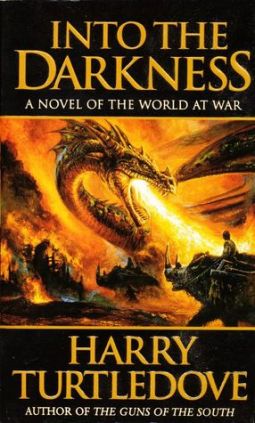Epic Musket Fights and Vampire-Like Magic: Guns of the Dawn by Adrian Tchaikovsky

(This weekend, I’ll be doing my thing at Conpulsion, Edinburgh’s truly excellent gaming convention. If you’re there, drop by and say hello.)
Guns of the Dawn
Adrian Tchaikovsky
Tor UK (700 pages, February 12, 2015, £16.99 in hardcover, £7.99 digital)
Adrian Tchaikovsky’s Guns of the Dawn is…
Imagine Pride and Prejudice meets Sharpe, or if some of the female characters of the Cherry Orchard got conscripted into All Quiet on the Western Front, or was it Red Badge of Courage or Catch 22?
With Magic.
In a nutshell, two vaguely 1800s nations go to war. As attrition grinds down her side’s army to the point where they are conscripting women, upper class Emily decides not to draft dodge and goes to war, in a red coat, with a musket, ultimately in a swamp. And somewhere in there, there is an emotionally complex romance, coming of age, a mediation on truth and propaganda, and a hint of… but that would be a spoiler.
Actually, the whole X meets Y thing breaks down very quickly. “Oh this is the French Revolutionary War..? or is it the American Revolution? Or…”
Tchaikovsky is obviously well-read, has life experience, understands war and organisations, and people, and if there are parallels with classic literary works and moments of Military History, it’s because they in turn reflect truths about life and people. Though, as I read on, I got the sense that he was quietly enjoying playing with reader expectations. Just sometimes, you think, “Oh I know how this goes. This is a Rorke’s Drift sequence…” and then it’s not.
So, Guns of Dawn is an original story — a hard thing to pull off these days. It’s also a really good military tale, serving up epic musket fights and and melees, awesome last-moment flanking movements and countercharges, vivid characters who grow and/or die unexpectedly, all with an easy attention to the technicalities of black powder warfare.
Having female soldiers works. It doesn’t, of course, detract from the military procedural angle. However, it does explore the way modernity liberates women.
The big thing is that, though women have always fought, during the era of muscle powered weapons, the average woman has done so at a disadvantage. Worse, in violent times and places, she has also lived under a more general threat of male violence, which in turn put her at the mercy of unreliable male protectors.
Enter gunpowder, and though soldiering requires physical toughness, anybody who can lift a musket can also pull the trigger. Once men have lost the monopoly on effective violence, women can more easily defend themselves and the world changes. By the end of the story, Emily is riding around her home county unchaperoned, but with a pistol in her belt. This empowerment, of course, affects the romantic thread. But you’ll need to read the book to find out about that.
So, Military, and Gender, but also Magic; this is a Military Fantasy tale.

Normally, Military Fantasy doesn’t quite work.
Sometimes the magic is ubiquitous and integrated, but strangely happens to replicate the technology of another era. Turtledove’s Into the Darkness, for example, reads like WWII but with dragons instead of Stukas — part of the charm, perhaps. Other times, the magic is rare enough that the story reads more like Military Fiction in an alternative history. The mages’ presence isn’t routine or integrated, and when they do turn the battle, the story reverts to straight Fantasy.
Tchaikovsky, however, does something clever.
His magicians are bulletproof while their power lasts, but not invulnerable. They’re a standard part of the army, but also rare. Though, as human flamethrowers, they pack a punch, and flamethrowers don’t belong in Napoleonic battles, they aren’t complete game changers in a world of muskets and grenades. So we get the sense of wonder, but they don’t break the battle stories. If anything, they’re handy for guarding one flank or breach offscreen, so the heroes can do heroic smiting on screen.
Cleverer still, in keeping with the primal forces they represent, Tchaikovsky’s magicians get their magic vampire-like through a mystic connection with the King.This has two interesting effects.
First, just as guns empower the women, magic empowers the mages to behave more like medieval warriors than soldiers. Outside the command structure, they stomp around doing High Fantasy against a prosaic early modern backdrop and seem all the more real and vivid for that.
Second, more importantly, this ties the magicians to the big picture plot through their personal loyalty to the king. The murder of one semi-divine king is what started the war, and the ambitions of another is what keeps it going.
However.
I wasn’t really thinking about all this as I read the book. I was caught up in the characters and their stories, nudged onwards by the exquisite pacing, riding the clear vivid style and light touch while I enjoyed the twists and turns. And when everything resolved itself on the very last page, I swore with glee.
This book is a supremely good read with a satisfying ending. That it’s also also thoughtful, wise and clever, is a bonus, like a good honest curry that leaves an exquisite aftertaste.
UPDATE This book is eligible for the 2016 Gemmell Awards.
M Harold Page (www.mharoldpage.com) is a swordsman and full-time author. His gritty, action-packed YA Dark Age adventure, Shieldwall: Barbarians! is now available on Amazon, as is his Storyteller Tools: Outline from vision to finished novel without losing the magic .